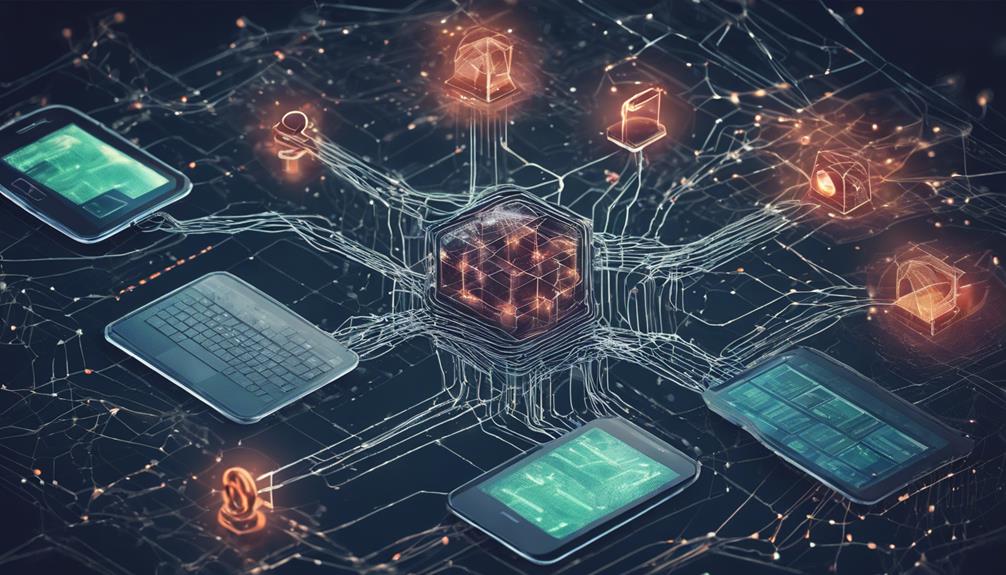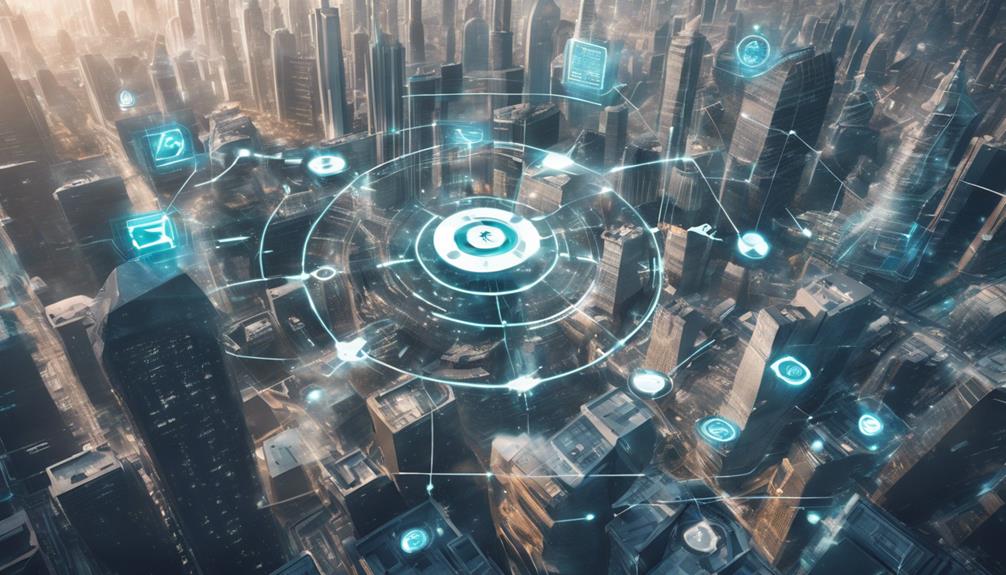Artificial intelligence (AI) is greatly impacting cybersecurity jobs by transforming roles, creating new job opportunities, and driving skill evolution. Professionals must adapt by acquiring specialized skills and collaborating effectively with AI technologies. Ethical hackers will play an essential role in ensuring the ethical use of AI in cybersecurity. While challenges like varying AI adoption levels exist, embracing continuous learning and upskilling is essential to thrive in this evolving landscape. The merging of human expertise with AI tools is key to effectively tackling cybersecurity challenges. Discover more about this dynamic shift in cybersecurity roles.
Key Takeaways
- AI will transform cybersecurity job roles by requiring specialized AI skills.
- New opportunities will emerge for cybersecurity professionals in oversight roles.
- Collaboration between AI and humans will enhance cybersecurity defenses.
- Continuous learning and upskilling will be vital to meet evolving skill requirements.
- Challenges in integrating AI in cybersecurity include varied adoption levels and regulatory gaps.
Impact of AI on Job Roles
With the integration of AI technologies in cybersecurity, the landscape of job roles within the industry is undergoing significant transformation. The impact of AI on job roles for cybersecurity professionals is profound, leading to the creation of new jobs that require a deep understanding of AI technology.
Ethical hackers, for instance, play an important role in ensuring the ethical use of AI in cybersecurity practices. As AI enhances malware detection and incident response capabilities, cybersecurity professionals must adapt to these changes by acquiring specialized skills and knowledge to effectively collaborate with AI systems.
The human element remains essential in cybersecurity, as the role of AI complements rather than replaces human expertise. This collaboration between AI and human professionals is crucial in recognizing and combating complex security threats efficiently. Cybersecurity professionals must embrace continuous learning and professional development to leverage the benefits of AI technology in their roles effectively.
Changes in Cybersecurity Skill Requirements
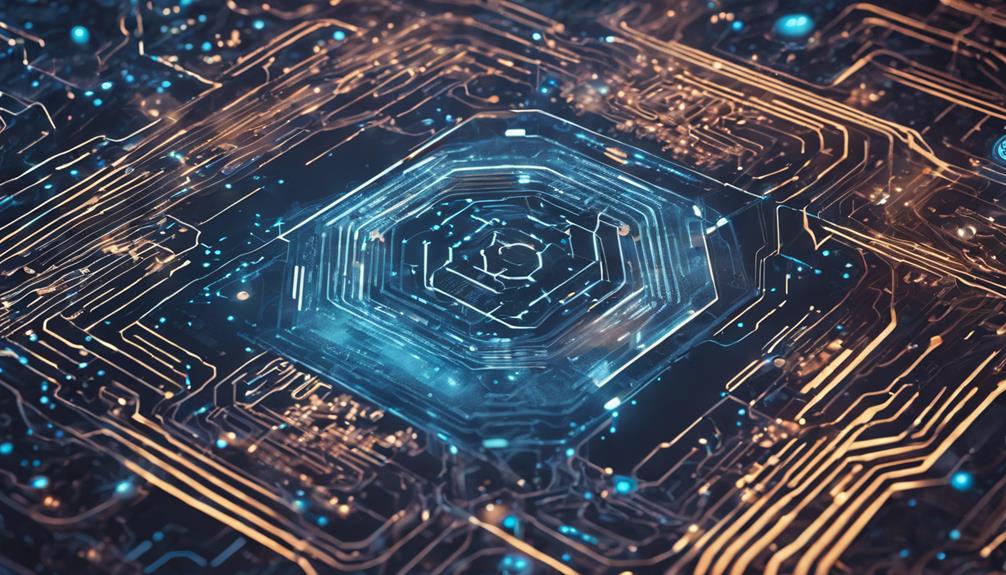
The integration of AI technologies in cybersecurity is driving a shift in the skill requirements for professionals in the industry. Cybersecurity professionals now need to adapt to evolving skill requirements that emphasize specialized skills in AI-driven threat detection and response.
Continuous learning and upskilling have become vital to meet the changing demands of cybersecurity jobs. AI is reshaping the landscape by highlighting the need for cyber defense experts with expertise in leveraging AI tools for improved security measures.
To thrive in this changing environment, cybersecurity professionals must focus on enhancing their expertise to effectively collaborate with AI technologies. By honing their skills in AI integration and advanced threat detection techniques, professionals can stay ahead in the cybersecurity field.
Embracing this shift in skill requirements not only guarantees job security but also opens up new opportunities for growth and innovation in the industry. Continuous learning and adapting to the changing demands will be essential for cybersecurity professionals looking to excel in the AI-driven cybersecurity landscape.
Collaboration Between AI and Professionals
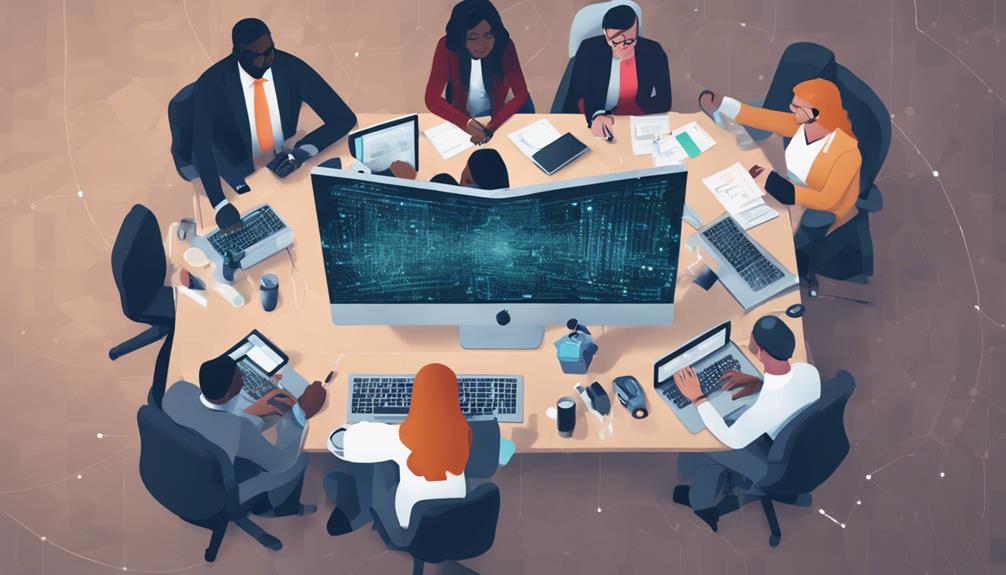
Effective collaboration between AI technologies and cybersecurity professionals is essential in enhancing overall cybersecurity defenses. AI technology plays a significant role in assisting professionals with tasks such as data analysis, threat identification, and decision-making, ultimately improving efficiency and response effectiveness.
However, human oversight remains paramount in interpreting AI-generated insights to guarantee accurate decision-making and to provide context to complex security threats. By leveraging human skills in conjunction with AI capabilities, cybersecurity professionals can better understand emerging threats, recognize patterns, and strengthen cybersecurity defenses collaboratively.
This collaboration enables professionals to harness the power of AI for enhanced threat identification and data analysis while utilizing human expertise for effective responses. Together, AI and cybersecurity professionals form a formidable team that combines the strengths of both entities to tackle cybersecurity challenges comprehensively.
New Opportunities in Cybersecurity Field

AI adoption in cybersecurity is creating a surge in new oversight roles and job opportunities within the field. As organizations increasingly integrate AI technologies into their cybersecurity strategies, the demand for cybersecurity professionals is on the rise. Job growth is particularly notable in technology-related roles, with AI specialists being highly sought after.
The impact of AI on the labor market, including generative AI, is reshaping the landscape of cybersecurity jobs, offering new avenues for professionals to explore.
According to Goldman Sachs, AI adoption could potentially boost global GDP by 7%, underlining the significant economic implications of this technological shift. Companies that embrace AI are not only enhancing their cybersecurity posture but also contributing to job creation within the industry.
The growing demand for cyber professionals signals a promising outlook for individuals looking to enter or advance in the cybersecurity field. Oversight roles and specialized positions related to AI adoption present exciting opportunities for professionals to make a meaningful impact in safeguarding digital assets and infrastructure.
Evolution of Cybersecurity Job Market

Rapid transformations within the cybersecurity job market underscore the dynamic nature of roles and skill requirements in response to technological advancements. As the industry faces a talent shortage and a skills gap, the evolution of cyber security jobs is becoming increasingly intertwined with artificial intelligence (AI). AI not only helps in threat detection but also enhances response capabilities, leading to more efficient cybersecurity practices. This integration of AI is creating new job opportunities for cybersecurity professionals, despite the challenges of finding entry-level positions without prior experience.
To illustrate the evolving job market in cybersecurity, consider the following table:
| Aspect | Impact |
|---|---|
| AI Integration | Enhances threat detection and response |
| Job Opportunities | Increases with AI implementation |
| Skills Gap | Addressed through AI technology |
With AI at the forefront, cybersecurity professionals are adapting to the changing landscape, leveraging technology to mitigate risks and protect digital assets effectively.
Challenges in Integrating AI in Jobs
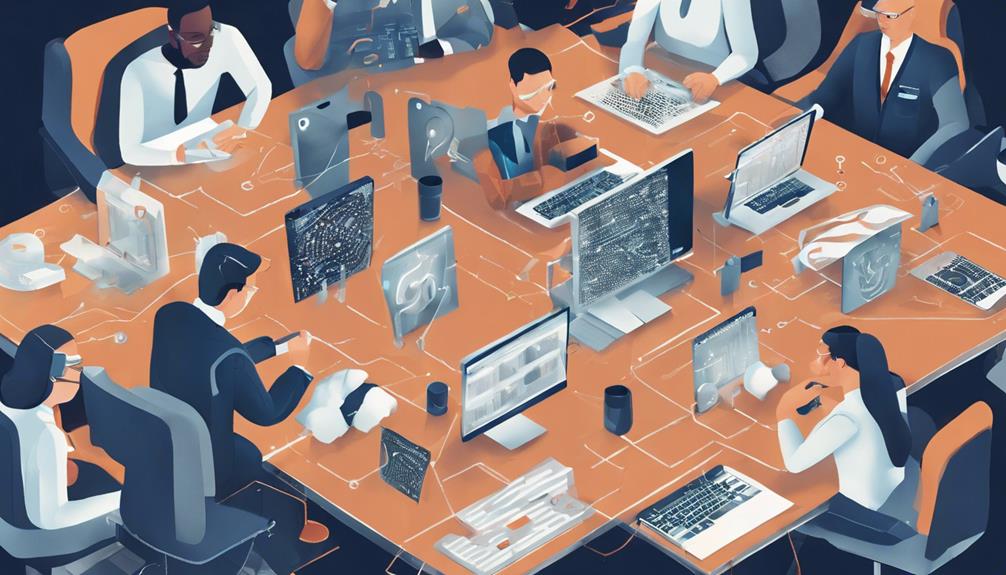
The integration of artificial intelligence (AI) in cybersecurity jobs presents significant challenges that professionals must navigate to effectively leverage AI technologies in their roles. Cybersecurity professionals are encountering obstacles in adopting AI due to the lack of specific regulations and formal policies governing its use.
Some key challenges include:
- Varied AI Adoption: Organizations exhibit differing levels of AI adoption, with only 27% having formal policies on safe and ethical AI use.
- Internal AI Regulation: The absence of standards in internal AI regulation poses hurdles for cybersecurity professionals seeking to implement AI effectively.
- Generative AI Tools: Approximately 12% of organizations restrict access to generative AI tools, impacting the cybersecurity workforce's ability to leverage these technologies.
- Need for Regulations: About 80% of respondents believe there is a necessity for specific regulations to govern AI use in cybersecurity.
- Regulatory Compliance: Ensuring compliance with regulations while integrating AI into cybersecurity operations remains a significant challenge for professionals in the field.
Skills for Future Cybersecurity Professionals
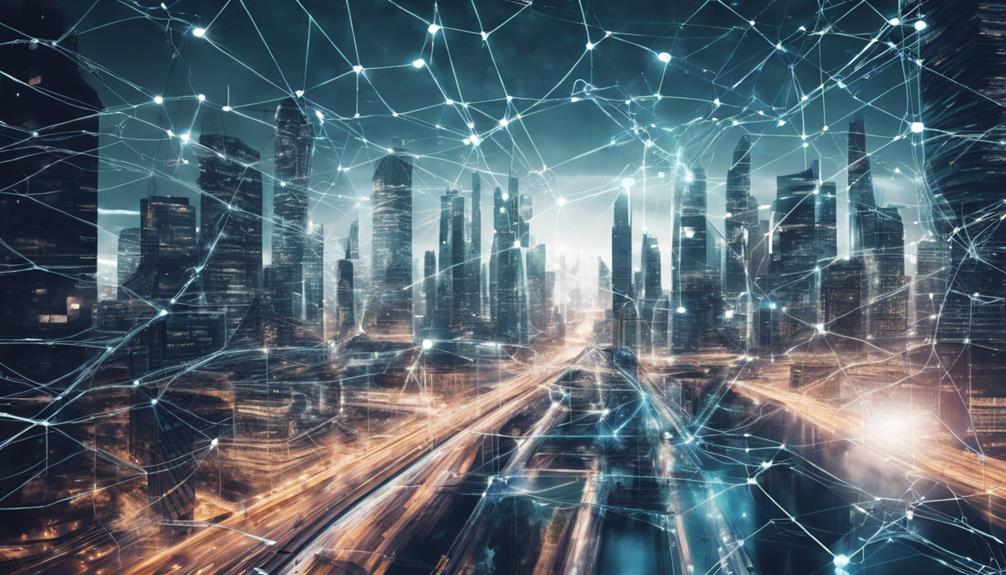
Future cybersecurity professionals must possess a combination of problem-solving abilities and effective communication skills to navigate the complexities of the evolving cybersecurity landscape. In addition to these foundational skills, specialized skills and expertise are becoming increasingly important in the age of AI adoption in cybersecurity. Continued learning and professional development are essential for individuals to stay relevant and competitive in this dynamic field. Professionals need to adapt their skills to incorporate AI technologies effectively, maximizing their potential while overcoming associated challenges. This adaptation not only guarantees current job roles are secure but also opens up new job opportunities globally. By embracing skills adaptation and continuous learning, cybersecurity professionals can harness the power of AI to enhance their capabilities and address emerging cybersecurity threats. The table below summarizes the key skills needed for future cybersecurity professionals:
| Key Skills | Description | Importance |
|---|---|---|
| Problem-solving abilities | Ability to analyze and solve complex issues in cybersecurity | Critical |
| Communication skills | Effective communication to collaborate and convey security insights | Essential |
| Specialized skills | Proficiency in specific areas like network security or threat intelligence | Crucial |
| Continued learning | Commitment to ongoing education and skill development | Essential |
Balancing Human Expertise With AI

Achieving a harmonious balance between human expertise and AI technologies is essential in optimizing cybersecurity defenses. In the domain of cybersecurity operations, a synergistic approach that leverages both human intuition and AI tools is vital for effectively combating the ever-evolving landscape of threats.
Here's how this collaboration can be harnessed:
- Human expertise: Experienced professionals bring problem-solving abilities necessary to handle complex cyber threats.
- AI tools: Enhance human capabilities in decision-making, creating a more robust defense strategy.
- Defense strategies: Collaboration between human experts and AI tools is essential for developing effective defense strategies.
- Human oversight: Required to interpret AI-generated insights accurately for threat identification.
- Threat identification: Human oversight ensures the correct interpretation of data and timely identification of potential threats.
Frequently Asked Questions
Will AI Affect Cyber Security Jobs?
The impact of AI on cybersecurity jobs is significant, with the potential to create new opportunities and challenges. Professionals must acquire specialized skills to adapt to AI integration, ensuring efficient collaboration between AI and human experts.
Can AI Be a Threat to Cyber Security?
AI can be a significant threat to cybersecurity due to its ability to enhance the speed and accuracy of attacks, create convincing deep fakes, and generate realistic content for malicious purposes. Organizations must stay vigilant to combat evolving cyber threats effectively.
What Is the Main Challenge of Using AI in Cybersecurity?
The main challenge of using AI in cybersecurity lies in the need for human validation, domain-specific training, and high-quality data to guarantee accurate results. Maintaining integrity, addressing biases, and handling evolving threats pose significant hurdles for AI systems.
What Jobs Are Most Threatened by Ai?
In the domain of cybersecurity, roles that rely heavily on rule-based decision-making are most threatened by AI advancements. Tasks like network monitoring, incident response, and manual data analysis could face displacement due to AI automation.
Conclusion
As AI continues to impact the cybersecurity industry, professionals must adapt to the changing landscape by acquiring new skills and embracing collaboration with AI technologies.
Despite the challenges of integrating AI into job roles, there are new opportunities emerging in the field that offer exciting prospects for future cybersecurity professionals.
Are you ready to embrace the evolution of cybersecurity with AI by your side?


